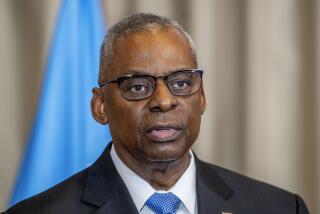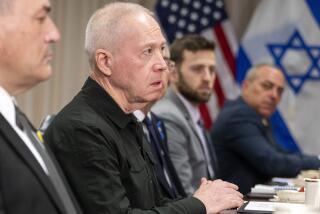Joint Chiefs, Bush meet
- Share via
washington -- President Bush traveled to the Pentagon’s “tank” Friday to meet with the Joint Chiefs of Staff and hear their concerns about the burdens placed on the military by the current troop level in Iraq.
The meeting in the Joint Chiefs’ secure conference room was the latest part of a wide-ranging assessment of the situation in Iraq in advance of the White House’s mid-September report on progress and congressional testimony by Army Gen. David H. Petraeus, the top U.S. commander in Iraq.
The Pentagon-based military leaders have been at odds with commanders in Iraq who are pushing to extend the current buildup of U.S. troops until at least April and are said to oppose any substantial troop reduction throughout 2008.
The Joint Chiefs have recommended a cut of up to half the force by the end of next year, administration officials have said.
The chiefs have argued that such adjustments are needed to maintain the U.S. ability to respond to other threats. And they have expressed concern about the wear on soldiers and Marines who have served multiple tours in Iraq.
Joining Bush at the meeting with the chiefs and Defense Secretary Robert M. Gates were Vice President Dick Cheney and Army Lt. Gen. Douglas E. Lute, the deputy national security advisor for Iraq and Afghanistan.
Petraeus, who is due in Washington next week, did not participate.
In a statement released after the session, Bush said that the much-anticipated status report from Petraeus would come “less than three months since our new strategy became fully operational and will assess what is going well, what can be improved, and what adjustments might be made in the coming months.”
Bush called on the Democratic-controlled Congress to “put partisanship and politics behind us” and commit to a “common vision” for a road ahead in Iraq.
Democratic leaders, who have unsuccessfully proposed various plans to force Bush to begin a troop withdrawal, have given no sign of changing their tune.
Congressional leaders announced Friday that Gates and Marine Gen. Peter Pace, the chairman of the Joint Chiefs, would testify Sept. 12 on Capitol Hill, the same week as Petraeus. Congress seeks to learn more about what other military advice Bush has been hearing.
Bush has made clear he will be listening most closely to Petraeus, but Gates has taken pains to ensure that the president hears from a variety of military voices.
“He wants to provide an opportunity for the seniormost military leaders to share with the president their feelings about the current situation and the way forward,” said Geoff Morrell, the Pentagon press secretary.
After Friday’s meeting at the Pentagon, Gates and Pace went to the White House for further consultations.
There is often pressure for military advisors to agree on their advice to the president. But Gates, through his aides, has signaled that he sees no reason to create a consensus among military leaders.
Morrell said the Pentagon gathering was partly intended to give the Joint Chiefs a forum to discuss the effect of operations in Iraq and Afghanistan on the overall military force.
The president, Morrell said, “wanted a check-in on how the all-volunteer force was holding up under the strain of multiple, lengthy deployments and how their families were holding up as well.”
Bush, in his statement, said he discussed increasing the size of the Army and Marine Corps. Currently, the Pentagon is trying to add 92,000 soldiers and Marines over the next five years.
Such an increase would “strengthen our military and help reset our forces to respond to multiple contingencies around the world at any given moment,” Bush said.
But the Joint Chiefs have been vocal about the need not only to expand the Army and Marines but to reduce the demands on the military, as well.
Gen. George W. Casey Jr., the Army chief of staff, has been clear that he thinks the Army’s capabilities will decline if the size of the force in Iraq is not reduced, said retired Army Gen. William L. Nash, an expert at the independent, nonpartisan Council on Foreign Relations.
Nash said he thought Casey would “tell the president that the Army cannot go beyond April without significant hardship on units, soldiers and families” and would be “upfront about the long-term consequences of the current troop levels in Iraq.”
--
More to Read
Get the L.A. Times Politics newsletter
Deeply reported insights into legislation, politics and policy from Sacramento, Washington and beyond. In your inbox twice per week.
You may occasionally receive promotional content from the Los Angeles Times.








